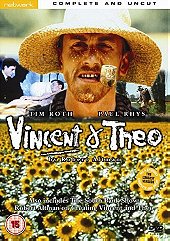Vincent & Theo was originally a miniseries for European television, and the film product suffers from being truncated. One gets the sense that many of the twists, turns, and slowly building character development and biographical details would be better served in their original format. Not that the film is bad, with Robert Altman at the helm even if the film doesn’t work as a whole, it’s still has plenty of interesting parts to keep you interested.
Vincent & Theo mostly works for me. The story of Vincent Van Gogh is rich with details and fascinating events that make most fiction about struggling artists seem cutesy in comparison. And the complicated relationship Vincent had with his brother Theo, a more repressed gallery owner. This being Altman, clichéd choices are left in the dust in favor of a more organic approach. Van Gogh’s struggling artist is at times prickly, bordering on likeable, and slowly descending into madness as his genius goes unnoticed in his lifetime.
Altman has two terrific lead actors at his disposal, Tim Roth as Vincent and Paul Rhys as Theo. Roth makes his Van Gogh an insular personality, true details like his penchant for eating paint or having seizures become organic outgrowths of an atypical personality, and his descent into madness and suicidal tendencies the logical outcome. Rhys has the trickier role of Theo, who is outwardly neurotic and capable of performing in society unlike his brother. Rhys also works with Roth to make the brothers share something like a telepathic bond, which goes a long way towards explaining how Van Gogh was able to alienate everyone else in his life but not his brother. Roth gets the obviously flashier role, but Rhys is the movie’s real MVP, providing a capable support system, and it becomes more shocking that Theo begins to crack up as time goes on.
There are many thematic instances of Altman appearing to make grand statements about art versus commerce or unappreciated genius. But these feel too easy of targets for such a singular, cynical vision as Altman’s. As I said earlier, these themes feel partially formed, and if I could view the complete miniseries in its original form, I wonder if they would be more subverted. Or possibly even fully explored and dug up to find newer talking points in these ideas. As it exists, Vincent & Theo is a solidly made portrait of a struggling artist. And I’m sure it would make for an exciting and strange double-feature with Minnelli’s equally intense, if more obvious but more satisfying, Lust for Life.
 Login
Login